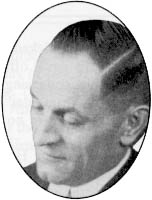
1892-1984
“Is Hitler a great man?” Niemoeller’s frightened wife, Else, asked him. “He is a great coward,” her husband replied. Then Niemoeller warned her that Hitler would certainly hound and brutalize him, for Niemoeller had that day contradicted the Fuehrer at a public meeting. That evening the secret police raided and searched the Niemoeller home. A few days later a bomb exploded their home, setting it on fire. Friends offered to smuggle him and his family to Sweden, a neutral country. He declined.
Niemoeller’s dramatic confrontation with the most powerful and evil man in Europe had been foreshadowed years earlier in the claustrophobic confines of a submarine. He and his fellow officers of the World War I U-boat he captained were debating the horrors of warfare. Niemoeller said he saw at this moment – January 25, 1918 — that the world is not a morally tidy place; the world is not guided by moral principles; neutrality in the world’s struggle is not possible. At the same time, those who uphold the right are scarcely without fault themselves. The submarine commander jotted in his diary, “Whether we can survive all trials with a clear conscience depends wholly and solely on whether we believe in the forgiveness of sins.”
Soon this naval officer, who had wanted since childhood to be a seafarer, followed his father’s footsteps into the Lutheran ministry. His first parish, in the heart of an urban slum, could not pay him enough to support his family. Carefully his wife picked the gold lace off his uniform and sold it to a jeweler. His naval officer’s pension, devalued many times over on account of the collapsing German economy, purchased only half a loaf of bread. Years later he wrote, “I discovered and still know what it feels like to have no fixed employment and means of existence and sustenance.”
Hitler soon took the nation by storm. He promised to rebuild the economy, restore people’s pride, overturn their national humiliation, and eliminate the rampant immorality in the larger cities. It is little wonder that people supported him. It is greater wonder that Niemoeller did not.
Niemoeller soon discovered that Hitler was distorting the Christian faith in order to use it in the service of political power. Hitler ordered pastors to read a proclamation of thanksgiving to their congregations, a proclamation praising the government for assuming “the load and burden of reorganizing the church.” Niemoeller refused. He realized that Hitler merely wanted to use the church politically, thereafter leaving it to rot “like a gangrenous limb.”
Soon Hitler used a decree that targeted pastors of Jewish ancestry. They were to e removed from their pulpits. Of the 18,000 Protestant pastors in pre-war Germany, only twenty-three were of Jewish descent. Yet the anti-semitic hatred of the Nazi party was so intense that even this small number could not be tolerated. The machinery of the state was mobilized to eliminate them.
Because of the opposition to official policies the government informed Niemoeller in November, 1932, that he had been “permanently retired.” His congregation assumed a difficult but courageous position; they informed the government that their pastor would continue to shepherd them. Two days later at a rally in a sports stadium a featured speaker shouted, “If we are ashamed to buy a necktie from a Jew, we should be absolutely ashamed to take the deeper elements of our religion from a Jew.” “Positive Christianity,” as the state church called its propaganda, had clearly repudiated Jesus Christ.
Harassment of pastors continued. Niemoeller steamed, “It is dreadful and infuriating to see how a few unprincipled men who call themselves ‘church government’ are destroying the church and persecuting the fellowship of Jesus.”
In July 1937 the secret police arrested Niemoeller. Already he had been to prison five times, and on each of those occasions he had been released within a day or two. He expected the same quick release this time. He was wrong. The next eight years found him behind bars, the personal prisoner of Hitler himself.
On his admission to the Berlin prison he was approached by the prison chaplain, a man Niemoeller recognized form his naval days and now know as a Nazi stooge. “Pastor Niemoeller,” the chaplain said, “why are you in prison?” Niemoeller stared back at him and asked, “Why are you not?
From Berlin he was sent to Sachsenhausen, a concentration camp. He asked for, and had returned to him, two possessions dear to him – his Bible and his wedding ring. While he was in solitary confinement and not permitted to converse with anyone, the only sounds he heard were the outcries of men undergoing torture.
At home Else suffered a nervous breakdown. She and the seven children were expelled form the manse and were left with neither income nor accommodation.
Niemoeller was transferred in 1941 from Sachsenhausen to Dachau. Four years later, in April 1945, he was taken to northern Italy for execution. Three days later, American forces liberated the area and took Niemoeller in their care. They found him in poor condition – exhausted, scrawny and tubercular.
In June 1945 he was reunited with his wife. While struggling with his own personal trials he had supported thousands more with his letters, coming back again and again to the work given to God’s people through Joshua 1:9: “Be strong and of good courage: be not frightened, neither be dismayed. For the Lord your God is with you wherever you go.”
After the war Niemoeller continued to work on behalf of the devastated people of Germany. International honours were accorded him. Yet whenever asked how he wished to be introduced, he invariable replied, “I am a pastor.”
A few days before his death he remarked, “When I was young I felt I had to carry the gospel. Now that I am old I know that the gospel carries me.”
Victor Shepherd